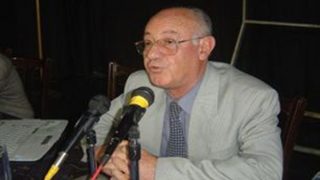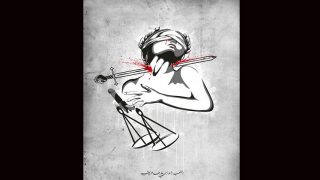An interview with Anwar Al-Bounni (Part I)
Today there are several trials in Europe against Syrians accused of committing grave crimes, primarily in their war-torn nation. Multiple organizations are focused on collecting evidence and testimonies to build viable cases for international trial, even as the Syrian conflict continues and the scenes of major crimes remain inaccessible. What good can be expected from pursuing justice abroad for crimes committed in Syria? What are the different types of courts and what are the best pathways for justice and accountability?
SyriaUntold met with award-winning human rights lawyer Anwar Al-Bounni to answer some of these questions. Mr. Bounni discussed with us the legislation and treaties governing these proceedings, the most prominent cases on trial in Europe, and what role can the pursuit of justice play for Syrians. The Syrian lawyer, famous for confronting the Syrian regime in court and defending dissidents, heads the Berlin-based Syrian Center for Legal Research and Studies. Here is the first part of our interview coupled with a quick overview of the changing landscape of international law and its limitations in relation to the Syrian context.
The International Criminal Court and the Rome Statute
At the heart of efforts to establish a global legal order for pursuing genocide, war crimes and crimes against humanity is the International Criminal Court established by the Rome Statute on July 17th, 1998 in the Hague.
The treaty was signed by 120 states. Jordan, Tunisia and Palestine were the only Arab states to ratify it. China & India never signed it, while Israel and the USA have not ratified the treaty. Russia withdrew its signature from the ICC founding statute in 2016.
The establishing treaty of the statute of the ICC emphasized that it is complimentary to national criminal courts jurisdictions, focusing on respecting national judicial sovereignty of the members on the one hand, and on the other, not expanding ICCs jurisdiction beyond what is feasible.
It also stressed that grave crimes that "alarm and worry" the international community must not pass unpunished and the prosecution of its perpetrators must be guaranteed.
Article 5 of the Rome Statute specified the crimes the court holds jurisdiction to look into with the following: The crime of genocide, crimes against humanity, war crimes and the crime of aggression. The ICC mandate also includes crimes committed against UN staff. Subsequent articles of the statue detailed what was meant by each of these terms. Our sidebar offers a short summary.
Lacking a police force of its own, the ICC relies on the support and cooperation of member states to investigate, arrest and prosecute criminals. It has limited jurisdiction to investigate cases in non-member states.
So far the ICC has been unable to act against Syria because Syria is not a State Party to the Rome Statute. The only way the Syrian case could be transferred to the ICC is through the passing of a resolution at the United Nations Security Council (UNSC), as was done in the Sudanese case in 2005 and the Libyan case in 2011.
But Russia, a permanent UNSC member, prevents this. Moscow, Assads strongest long term ally, has used its veto power 12 times to block the passage of UN resolutions against Syria.
Facing deadlock at the United Nations, lawyers and citizens from Syria have turned to local courts in other countries invoking the principle of universal jurisdiction wherever possible, and national jurisdiction in cases of foreign or dual nationality victims of Assad crimes.
One of the most prominent ongoing examples of the implementation of universal jurisdiction today is the case against the Franco dictatorship on trial in Argentina. After the death of Franco, a Spanish law was passed in 1977 granting amnesty to crimes committed under the dictatorship, so Spanish courts have been unable to prosecute any of the criminals responsible for crimes against humanity, including torture, extrajudicial killings and enforced disappearances committed between 1936 and 1977.
In 2010, a criminal complaint was filed by human rights organizations to an Argentinean investigating judge on behalf of Spanish victims. Based on the universal jurisdiction granted him by the Argentinean law, the judge issued detention orders against twenty of the accused. The case is currently still under investigation.
Many other similar cases are also still ongoing, such as the French and German criminal investigation of crimes committed in the Guantanamo bay USA detention centre in Cuba, by USA officials against citizens of various nationalities.
Trial or arrest:
Mr. Bounni is convinced that justice for Syrians cannot be attained abroad, away from Syria. The focus, in his opinion, should not be on obtaining jail sentences in Europe but rather on getting arrest warrants issued by local courts, as these are stronger than those issued by the ICC.
One of the most famous examples of arrest warrants issued by the ICC was that of the trial of the Sudanese president Omar Al-Basheer. The Sudanese case was transferred to the ICC via the UN Security Council in 2005 since Sudan was not a ratifying signatory to the Roma treaty. In 2009, an arrest warrant was issued for Al-Basheer for accusations of committing war crimes and crimes against humanity. The Sudanese governments did not hand Al-Basheer over to the ICC and refused to cooperate with it. While the defendant continued to serve his post as head of state, his international mobility was drastically limited even on official missions. After the warrant was issued, Al-Basheer only traveled to China and India outside of his African and Middle Eastern neighborhood.
On the other hand, the trial of the previous Chilean president, Augusto Pinochet, set a precedent of national court trials based on the principle of universal jurisdiction. Pinochet was arrested in London in 1998 after a Spanish court issued a warrant for his arrest. The Spanish court had accepted the case in 1996 based on the International jurisdiction granted it by the Spanish law, while the accusations against him were of crimes committed on Chilean land against non-Spanish citizens. Two years after his arrest, however, the British government overruled a parliamentary decision to extradite Pinochet to Spain on medical grounds, and he was allowed to return to Chile where he died of a heart attack in 2006.
Today such a scenario seems highly unlikely for Syria's Assad, as his precarious security position has drastically limited his mobility within Syria itself, let alone globally. So the chance of his being arrested while traveling in a third country that opts to abide by those international commitments are certainly thin.
However, Syrians and human right defenders all over the world continue to pursue legal efforts to hold him and his regime accountable for the crimes they have committed. In our second part of the interview with Mr. Bounni we discuss the most prominent of these efforts currently underway in Europe.







